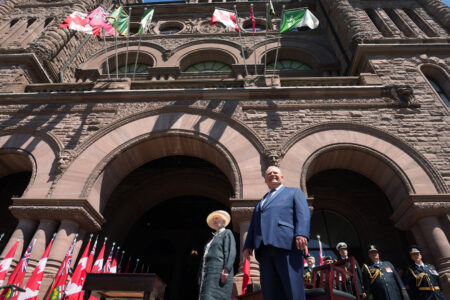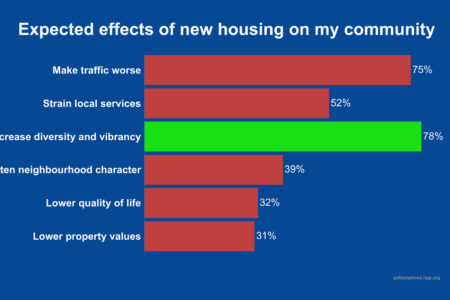
In the pandemic, Canadians are actually feeling better about their representative democracy. At the Samara Centre for Democracy, we looked at the Consortium on Electoral Democracy’s national public opinion data from 2019 and 2020 and found that trust in Canadian political leaders and fellow citizens is up. Cynicism about politics is ever so slightly down. But amidst these generally warming feelings, one metric remains unchanged: Canadians do not feel like they have a say in what governments do.
While it’s easy to get distracted by old canards about collapsing trust and surging populism, governments are failing to recognize this central problem — Canadians still want a greater say in decisions affecting their lives. Even when they trust political leaders and think the system is working, Canadians don’t feel adequately seen or heard. It’s time to try something new.
In the world of democratic innovation, a clear leader has emerged. It’s deliberative democracy, a democratic theory and practice centred not on voting, but on deliberation. It’s small groups of citizens listening, learning, discussing and making decisions together. It’s challenging traditional approaches to public consultation and participation.
Two decades ago, deliberative democracy was the great passion of many political theorists, but it had little impact on mainstream political discourse. Now, in the last year alone, deliberative processes have been celebrated in publications ranging from Science to The Economist. More countries are adopting the flagship practice of deliberative democracy — the citizens’ assembly, where a randomly selected, diverse and representative group of lay people are brought together to learn about an issue, reach consensus and make recommendations to governments.
Citizens’ assemblies, or citizens’ reference panels, offer a whole suite of benefits. When used correctly, they are tools for giving people a sense of agency, facilitating learning, transcending polarization, engendering trust in democratic processes, and building agreement and acceptance of policy decisions.
Some Canadians may be surprised to learn that on the global stage, Canada is seen as a pioneer in the field. In the mid-2000s, both British Columbia and Ontario held citizens’ assemblies on electoral reform. The recommendations of those assemblies did not ultimately become law. But the experiences may have been more influential in acting as a catalyst for deliberative experiments abroad than they were in domestic policy terms.
Canadians have continued to lead since that time. Peter MacLeod and the team at the democratic engagement consultancy company MASS LBP have quietly refined the practice of citizen deliberation, working with various levels of government and other public authorities, and providing leadership to a global “deliberative wave.” Having conducted more than three dozen deliberative processes since 2007, entailing more than 50,000 volunteer hours from 1,400 participants, MASS LBP finds that people not only want a say but are also willing to serve.
In Europe, high-profile national citizens’ assemblies have taken place in Ireland, France and Germany, to name a few examples. Most exercises have been ad hoc, temporary, one-off and commissioned directly by governments.
However, the most interesting development is the baby steps toward integrating citizens’ assemblies with institutions of representative democracy. For example, after experimenting with citizens’ panels last year, the Ostbelgien regional legislature of eastern Belgium now hosts permanent ongoing panels, overseen by a citizens’ council also made up of randomly selected residents. The Madrid city council also recently committed to a permanent citizens’ assembly.
Here’s how Canada can take back leadership of the “deliberative wave.” Our Parliament should become the first national legislature to commit to a permanent system of citizens’ assemblies and formally bind itself to that promise.
What’s the added value of permanent, national citizens’ assembly infrastructure particularly when public deliberation has worked so well at the community level?
For one, it would help strengthen the connection Canadians feel to federal political institutions, which they generally regard with more skepticism than local, provincial, or territorial ones.
Imagine a collection of Canadians from across the country learning more about how equalization works, and then having a good-faith discussion about it.
Moreover, our national governance simply needs a better quality of deliberation. Regional differences remain the source of some of Canada’s most profound polarization and this may be an area that would particularly benefit from the leadership of citizens. Imagine a collection of Canadians from across the country learning more about how equalization works, and then having a good-faith discussion about it. Wouldn’t that be preferable to the grandstanding, assigning of blame, and borderline misinformation we get from some politicians on that issue?
Third, this is a way of raising the profile of democratic deliberation generally. Ideally, civic deliberation should happen at a scale in which most citizens have a reasonable chance of participating at some point (sort of like jury duty). That requires local governments, provincial and territorial legislatures, and other public authorities to convene citizens’ assemblies as a matter of course. One way to encourage that behaviour is to showcase it on the main stage of national political life. Citizen deliberation should be visible. Citizens’ assemblies have been found to increase citizens’ issue knowledge and respect for other viewpoints even when those citizens didn’t participate. But they need to see it. They need to know it’s happening.
How might a permanent parliamentary citizens’ assembly work? Because this is new terrain, permit us to set out some early design thinking.
As the new Senate moves away from classical adversarial Westminster parliamentarism toward a kind of imperfect, non-partisan deliberative body, it’s ideally placed to house a permanent system of national citizens’ assemblies. Citizens’ assemblies could assist the Senate in its deliberative role while lending it some democratic legitimacy. The Senate is also a more favourable entryway for the decisions of citizens’ assemblies, where they wouldn’t immediately run into electoral or partisan politics.
The specific mechanics are less important than the general principle, but it’s easy enough to sketch out a rough model. For example, the Senate could create a committee dedicated to establishing the mandate for a citizens’ assembly. That committee could be compelled in the standing orders to recommend the terms and focus of the assembly within a certain number of days from the beginning of a new parliamentary session.
The Senate is a more favourable entryway for the decisions of citizens’ assemblies, where they wouldn’t immediately run into electoral or partisan politics.
A random, representative sample of citizens would be selected by civic lottery, and accommodated in Ottawa for the duration of the assembly. Some experts have suggested that 40 hours is an appropriate amount of time to learn about, discuss and make decisions on an issue. Forty hours wouldn’t be hard to reach, either by bringing participants to Ottawa on several occasions over a period of months (requiring more travel, but also allowing participants to gather perspectives from their local community during the process), or, perhaps more feasibly, by hosting participants just once. For example, citizens’ assemblies could run full-time through the spring and fall when the Senate is in a planned recess.
When a citizens’ assembly has completed its deliberations and reported its recommendations, the Senate committee should again be compelled to propose a new assembly within a prescribed time frame. The result would be a permanent mandate for national citizens’ assemblies, with one perpetually underway, in planning, or imminent. The most critical design dimension is to ensure a meaningful response from both houses of Parliament, so that citizens’ assemblies are not sideline performances, but integral to the business of Parliament.
In time, the assemblies could become something like a third house of Parliament – literally. In the short-term, they could take place in the physical Senate chamber itself, or in committee rooms. But in a decade, the Senate and House of Commons will return to Centre Block, which is currently under renovation. When that happens, the temporary Senate and Commons chambers will be vacant. There, the permanent citizens’ assemblies could be granted a dedicated home, next door to Parliament. It would serve as a potent symbol of a significant evolution in Canada’s democratic institutions, unlike anything that exists in our peer democracies.
Maybe we’re getting ahead of ourselves. Step one to institutionalizing citizen deliberation can be simpler, such as a national citizens’ assembly convened by Parliament in 2021 to consider priorities for social and economic rebuilding after the pandemic. Even better, pair a national assembly with dozens of local assemblies, all given resources through a federal democratic action fund as MASS LBP has proposed. At the moment, political elites are having great fun notionally redesigning the country and campaigning for various bold visions for a post-pandemic Canada. But if there was ever a time to give Canadians a greater say in shaping their future, it’s now.
Canadians have ample trust in their leaders. Yet leaders do not always reciprocate that trust. After decades of experimentation with public deliberation around the world, the practice has been shown to engender political efficacy, combat polarization and inform public opinion and decision-making. Given the right opportunities, citizens are perfectly capable of contributing their judgment and insight to complex issues. It’s simply a matter of figuring out how to stitch those processes into the fabric of our representative democracy. As an early deliberative pioneer, Canada shouldn’t be afraid to lead once again.
Photo: Shutterstock/By hobbit











